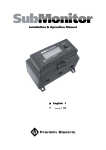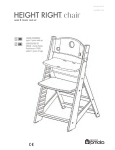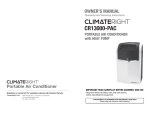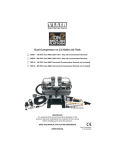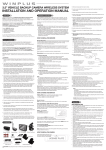Download CDA CI931 washer dryer
Transcript
CI931 CI93 1 Int Integrated egrrat a ed e W Washing a ashing Mac Machine hine e Manual ffor or o Inst Installation, allattion, Use and Maint Maintenance enancce *\Z[VTLY*HYL+LWHY[TLU[;OL.YV\W3[K/HYI`9VHK3HUNHY5V[[PUNOHTZOPYL5. *\Z[VTLY*HY L+LWHY[TLU[;OL.YV\W3[K/HYI`9VHK K3HUNHY5V[[PUNOHTZOPYL5. /@ ; : 01949 [email protected] www.cda.eu 0194 49 862 012 F : 01949 862 003 E : service@ @cda.eu W : www .cda.eu Contents Page 1 Important information Page 2 Warnings Page 3 Washing machine specifications Page 4 Unpacking the washing machine and removing the transit bolts Page 5 Connecting to the mains water supply Page 6-7 Levelling and electrical information Page 8 Before first use Page 9 Preparing garments for washing Page 10 Detergents and additives Page 11-12 Selecting the wash programme Page 13-14 Programmes Page 15 Spin speed and anti-crease Page 16 Time delay Page 17 Starting up Page 18 Wash programme phases and power cuts Page 19-20 Maintenance and cleaning Page 21-22 Troubleshooting Important This appliance must only be used for the purpose for which it is intended, i.e. domestic use. Any other use could be dangerous and may lead to premature failure of the appliance. The CDA Group Ltd cannot be held responsible for injuries or losses caused by incorrect use or installation of this product. Please note that CDA reserve the right to invalidate the guarantee supplied with this product following incorrect installation or misuse of the appliance. Under no circumstances should any external covers be removed for servicing or maintenance except by suitably qualified personnel. Appliance information: Please enter the details on the appliance rating plate below for reference, to assist CDA Customer Care in the event of a fault with your appliance and to register your appliance for guarantee purposes. Appliance Model Serial Number CE Declarations of Conformity: This appliance has been designed, constructed and marketed in compliance with safety requirements of EEC Directive 2006/95/EEC (Low voltage) and requirements of EMC Directive 2004/108/EEC. IMPORTANT INFORMATION FOR CORRECT DISPOSAL OF THE PRODUCT IN ACCORDANCE WITH EC DIRECTIVE 2002/96/EC. At the end of its working life, the product must not be disposed of as urban waste. It must be taken to a special local authority differentiated waste collection centre or to a dealer providing this service. Disposing of a household appliance separately avoids possible negative consequences for the environment and health deriving from inappropriate disposal and enables the constituent materials to be recovered to obtain significant savings in energy and resources. As a reminder of the need to dispose of household appliances separately, the product is marked with a crossed-out wheeled dustbin. 1 Warnings To avoid the risk of fire, electric shocks, injury or damage when using your washing machine, please take the following precautions: s Please read all the instructions before using the washing machine. s Do not wash items that have previously been cleaned, washed, soaked or treated with petrol, solvents for dry cleaning, other inflammable substances or explosives, as they produce fumes that could catch fire or explode. s Do not add petrol, solvents for dry cleaning or other inflammable or explosive substances to the wash water as they produce fumes that could catch fire or explode. s Do not repair or replace any part of the washing machine or try to carry out any type of servicing unless it is recommended in the maintenance instructions in the manual. s Do not climb onto the machine or stand on the open porthole door. s Do not use an extension lead or adaptor to connect your washing machine to the mains supply. s The machine should only be used for the purpose it is designed for. s Follow the washing instructions recommended by the manufacturer of the garment to be washed. s Do not turn your washing machine on until you are sure that: It has been installed in accordance with the installation instructions. All the water, drainage, mains electricity and earth connections meet the local regulations and/or other applicable regulations. Important: Ensure that the transit bolts have been removed prior to using the machine. Washing Machine Specifications Power cord Drain hose Control panel Detergent dispenser Stainless steel drum Porthole door Accessible filter Adjustable feet Accessories Water inlet hose 2 Unpacking the Washing Machine s Remove the base, corner protectors and top cover (Figure 1). Removing the Transit Bolts s Remove the screws holding the plastic covers to the back of the washing machine (Figure 2 and 3). s Loosen and remove the 3 transit bolts (Figure 3). s Cover the holes with the plastic covers you have just removed (Figure 2). fig. 1 Do not throw the transit bolts away. If you need to move the washing machine after installation you should first replace the transit bolts. fig. 2 fig. 3 fig. 4 3 Connecting to the Mains Water Supply The water supply hose is located inside the drum. s Connect the bent end of the hose to the threaded inlet of the electrovalve located at the rear of the washing machine. s Connect the other end of the hose to the water inlet. Then securely tighten the connecting nut. fig. 4 The drain hose must be securely fastened to the outlet to prevent any risk of the drain hose becoming detached and causing flooding. The washing machine must be connected to the mains water supply, using the new supply hoses supplied with the appliance. Do not use water supply hoses that have been used previously. fig. 5 For your washing machine to work properly, the mains water pressure must be between 0.05 and 1MPa (0.1 - 10 bar). Drainage Connection s It is recommended that you have a fixed drainage outlet 50 to 70 cm from the floor. s Avoid the drain hose being too tight, kinked or restricted. s The water outlet can either be connection to a water drain or to a sink outlet spigot. This connection should be a minimum of 50cm and a maximum of 110cm from the floor. The drain hose should be no longer than 4m in length to ensure good performance from the dishwasher. s After connecting the water supply, check to ensure there are no leaks. 4 fig. 6 Levelling s To reduce the noise level from the washing machine and to prevent unnecessary movement during use, you should ensure the washing machine is level using the adjustable feet. Please note: Raising the washing machine too high can affect the stability of the appliance. fig. 7 Electrical Connection s Check the rating plate located on the porthole door of the washing machine before connecting the appliance to the power supply. Ensure that the voltage reaching the plug is the same as that on the plate. Do not remove the rating plate. The information on it is important. Do not plug the washing machine plug into the socket with wet or fig. 8 damp hands. To remove the power cord, pull on the body of the plug, not the cable. If the power cord is damaged, it must be replaced by a cord or special unit provided by either the manufacturer or your aftersales fig. 9 service. If necessary, stand the washing machine on a piece of worktop or similar, ensuring the worktop is flat on the floor. 5 Electrical information Warning! This appliance must be earthed. The mains lead of this appliance has been fitted with a BS 1363A 13 amp fused plug. To change a fuse in this type of plug, follow the steps below: 1. Remove the fuse cover and fuse. 2. Fit replacement 13A fuse, ASTA approved to BS 1362 type, into the fuse cover. 3. Replace fuse cover. Important: Do not use the appliance without the fuse cover in position. How to connect an alternative plug )FTHElTTEDPLUGISNOTSUITABLEFORYOURSOCKETOUTLETTHENITSHOULDBECUTOFFANDDISPOSEDOFSAFELYTOAVOIDTHERISKOF electric shock. A suitable alternative plug of at least 13 Amp rating to BS 1363 should be used. As the colours of the wires in the mains lead of this appliance may not correspond with the coloured markings identifying the terminals in your plug, proceed as follows:s 4HEWIREWHICHISCOLOURED'2%%.AND9%,,/7MUSTBECONNECTEDTOTHETERMINALWHICHISMARKEDWITHLETTER%OR BYTHE%ARTHSYMBOLORCOLOURED'2%%.AND9%,,/7 s 4HEWIREWHICHISCOLOURED",5%MUSTBECONNECTEDTOTHETERMINALWHICHISMARKEDWITHTHELETTER.OR COLOURED",!#+OR",5% s 4HEWIREWHICHISCOLOURED"2/7.MUSTBECONNECTEDTOTHETERMINALWHICHISMARKEDWITHTHELETTER,OR COLOURED2%$OR"2/7. )FINDOUBTREGARDINGTHEELECTRICALCONNECTIONOFTHISAPPLIANCECONSULTAQUALIlEDELECTRICIAN$ONOTSHORTENTHE supply cable, the appliance may require removing for servicing. N.B. Ensure that the plug socket is situated in an easily accessible place. 6 Before First Use s When your washing machine has been correctly installed, we recommend that you pre-clean the machine. This is to check that the installation, the connections and the drainage are all correct, and to thoroughly clean the inside of the washing machine before any wash programmes are run (see the operating instructions on the following pages). fig. 10 s Prior to pre-cleaning you should ensure the transit bolts have been removed. s Select the normal programme at 60ºC (Figure 10). s Press the Start/Pause button (Figure 10). 7 Preparing Garments for Washing Preparation s Before placing the clothes in the drum, make sure all the pockets are empty (Figure 11). Any small objects may block the drain pump. Sorting the Clothes fig. 11 Sort the clothes according to fabric and how they are made: 0TWVY[HU[ s We recommend using the delicate programmes for sensitive fabrics. There is a special wool programme for woollens (Figure 12). s Sort clothes according to how soiled they are (Figure 13). 4HRLZ\YLILMVYLOHUK [OH[`V\Y^VVSSLUZJHU ILTHJOPUL^HZOLK s Wash lightly soiled garments using a short programme. s Use a programme without prewash for medium-soiled garments. fig. 12 s Wash heavily soiled garments using a long programme with prewash. s Sort your clothes according to colour (Figure 14). 7YL^HZO >HZO >HZO s Wash whites and coloured separately. We recommend loading the washing machine to its full capacity for best water and energy efficiency. fig. 13 Whenever possible, we recommend that you wash garments of different sizes within the same wash programme. This improves the washing action and also aids the correct distribution of the garments in the drum when spin-drying, and the washing machine will therefore be quieter. 30 40 60 We recommend that small garments are placed in a wash bag. 90 *VSK fig. 14 Before using the drying programme, first check the label on the garment to make sure it can be tumble dried. 8 Detergents and Additives Your washing machine’s detergent dispenser has three compartments. 79,>(:/ >(:/ -()90*:6-;,5,9 s Add the detergent or additive to the detergent dispenser before starting the wash programme (Figure 15). s Liquid detergents may also be used in this washing machine. The level of liquid must never be higher than the MAX mark printed on the dispenser wall. fig. 15 Remember that the amount of detergent to be used will always depend on: s The amount of clothes to be washed. s How heavily the clothes are soiled. s The hardness of the water (Information on water hardness in your area can be obtained from your local water board). We recommend the use of a decalcifying product if the water hardness is high in your area. fig. 16 Eco Note Remember that concentrated detergents exist which are more environmentand nature-friendly. The use of more detergent than necessary will not improve your washing results, and apart from costing you money it will have a negative effect on the preservation of the environment. fig. 17 We therefore recommend you follow the detergent manufacturer’s instructions. 9 Selecting the Wash Programme Start/stop Start/stopbutton button Screen drying time Drying time start pause spin CI931IN delay timer option 6Kg Detergent dispenser Programme selector dial Spin and Delay time anti-crease button button Additional function button fig. 18 To select a wash programme: s Press the programme selector dial to release it (Figure 19) . s Select the wash programme by turning the programme selector dial (Figure 19 - See programme table). s The display on the control panel will light up. fig. 19 To Select the Dry Programme: To select a day program: s Select the drying time in minutes by pressing the drying time button sThe drying time will show on the display and increase with each press of the drying time button. elay mer n optio fig. 20 Important If you select the wash and dry programme, the load must not be over 4kg (or 1.5kg for delicate wash programme). You may need to remove some items to lighten the load. y dela r time opti spin fig. 21 10 Washing Machine Programmes There are five types of programme: Normal programmes Delicate programmes Wool programme Auxiliary programmes Drying programmes PROGRAMMES Normal Auxiliary Wool Delicate Delicate 1 Normal 8 Delicate cold 12 Wool 35oC 12 Rinses 14 Normal Dry 2 Quick 30oC 9 Delicate 30oC 13 Spin Drying 15 Delicate Dry 3 Normal 30oC 4 Normal 40oC 10 Delicate 40oC 5 Normal 60oC 6 Normal 90oC 7 Prewash 60oC Eco Note We recommend you choose a wash programme without prewash whenever possible. This will save you money and help protect the environment. 11 Washing Machine Programmes Drying prog. Auxiliary prog. Wool P. Delicate programmes Normal programmes Normal cold *VSK *V[[VU3PULU KLSPJH[LJVSV\YZ ]LY`SPNO[ZVPS Quick 30ºC *V[[VU3PULU ^OP[LZJVSV\YZ ]LY`SPNO[ZVPS Normal 30ºC *V[[VU3PULU KLSPJH[LJVSV\YZ SPNO[ZVPS @,: Normal 40ºC *V[[VU3PULU MHZ[JVSV\YZ SPNO[ZVPS @,: (*) Normal 60ºC *V[[VU3PULU MHZ[JVSV\YZ TLKP\TZVPS @,: Normal 90ºC *V[[VU3PULU ^OP[LZ OLH]`ZVPS @,: Prewash 60ºC *V[[VU3PULU ^OP[LZMHZ[JVSV\YZ OLH]`ZVPS Delicate cold @,: @,: 56 @,: @,: :`U[OL[PJJV[[VUTP_ KLSPJH[LJVSV\YZ ]LY`SPNO[ZVPS @,: Delicate 30ºC :`U[OL[PJJV[[VUTP_ KLSPJH[LJVSV\YZ SPNO[ZVPS @,: Delicate 40ºC :`U[OL[PJJV[[VUTP_ KLSPJH[LJVSV\YZ TLKP\TZVPS @,: Wool 35ºC *VSK >VVS^VVSTP_ ^OP[LZJVSV\YZ SPNO[ZVPS @,: 56 @,: Rinses *V[[VUJV[[VUTP_ :`U[OL[PJ+LSPJH[L >VVS^VVSTP_ @,: 56 @,: Spin-drying *V[[VUJV[[VUTP_ :`U[OL[PJ+LSPJH[L >VVS^VVSTP_ 56 @,: Normal dry *V[[VU3PULU Delicate dry :`U[OL[PJTP_LKMHIYPJZ >663 (*) Programme for wash and energy consumption assessment in accordance with standard EN60456, press intensive wash button. 12 Anti-crease Spin speed selection No spin Fabric type Easy-iron Possible option buttons Recommended temperature Extra rinse Intensive wash Programme Washing Machine Programmes Max load of clothes (Kg) Wash product compartment Programme description Total consumption kWh/litres Approx. duration (minutes) 5VYTHS^HZOYPUZLZ MHIYPJJVUKP[PVULYPM KLZPYLKHUKSVUNMPUHSZWPU :/69;^HZOYPUZLZ MHIYPJJVUKP[PVULYPM KLZPYLKHUKSVUNMPUHSZWPU 5VYTHS^HZOYPUZLZ MHIYPJJVUKP[PVULYPM KLZPYLKHUKSVUNMPUHSZWPU 7YL^HZOUVYTHS^HZOYPUZLZ MHIYPJJVUKP[PVULYPM KLZPYLKHUKSVUNMPUHSZWPU +LSPJH[L^HZOYPUZLZ MHIYPJJVUKP[PVULYPM KLZPYLKHUKNLU[SLMPUHSZWPU >663^HZOYPUZLZ MHIYPJJVUKP[PVULYPM KLZPYLKHUKNLU[SLMPUHSZWPU 9PUZLZMHIYPJJVUKP[PVULY PMKLZPYLKHUK SVUNMPUHSZWPU · +YHPUHUKSVUNMPUHSZWPU · 5VYTHSKY` · +LSPJH[LKY` NOTE: the KWh and litre consumptions and programme durations may vary depending on the type and amount of clothes, mains water pressure, etc. 13 Spin Speed Selection and Anti-Crease You should first select the wash programme and then select the wash options (Changing the programme cancels the preset selected options). Each selected programme has its own preset spin speed. drying time spin delay timer option fig. 22 Spin speed s You can reduce the spin speed or remove it completely by pressing the spin button (Figure 22). drying time s The spin speed will gradually reduce each time the spin button is pressed at 100 r.p.m. intervals to a minimum of 400 r.p.m (Figure 23). spin delay timer option No spin fig. 23 s Press the spin button again to get to the no spin option and the display will show “0” (Figure 24). s A programme without a final spin is used to prevent creasing when washing special fabrics. Anti-crease option drying time spin delay timer option s Pressing the spin button again will select the anti-crease option (Figure 25). fig. 24 s The wash programme stops on the last rinse, with the clothes left in water. s When the option is deactivated, the washing machine continues the programme, draining and spin-drying. s It is used, for example, when you are not at home and want to delay the spin drying until you get home, to prevent the clothes creasing after spindrying and being left in the drum to be removed. drying time spin delay timer option fig. 25 14 Delay Timer Delay timer selection button drying time s A delay of up to 24 hours can be selected. The delay must be selected after choosing the wash programme. s To set the required delay, press the delay timer button (Figure 26). Each time the button is pressed the delayed start of washing is increased by one hour. spin delay timer option fig. 26 Cancelling the delay s To cancel the delay, press the delay timer button repeatedly to cycle through the full 24-hours, and then press again. s The delay will be cancelled when 24 hours have been reached and the button is pressed once more. If the programme is changed the delay is also cancelled. Additional functions Additional function selection button depending on programmes. drying time s There are 3 options: easy iron, extra rinse and intensive wash. s Press the button and the desired option will be displayed (Figure 27). s By pressing the button several times you can choose between several combinations of one, two and up to three additional functions at the same time depending on the programme selected (Figure 28). spin delay timer option fig. 27 Option 1: Easy-iron drying time This option prevents garments from creasing by means of carrying out a special programme with special turns to fluff out the garments after spin-drying and make them easier to iron. spin Option 2: Extra rinse delay timer option fig. 28 Increases the level of the final rinse obtained in the clothes; suitable for large loads and garments belonging to people with sensitive skin. However, this option will increase your water consumption. Option 3: Intensive wash This option, specially recommended for heavily soiled or stained clothes, achieves better results by extending the normal wash cycle. If during the additional function selection, the programme is changed or the Start/Pause button is pressed, all the functions selected until then are cancelled. 15 Starting Up Start/Pause button s To start up the washing machine you have to press the Start/Pause button (Figure 29). s The time remaining (in minutes) until the end of the programme will appear on the display at all times. drying time delay imer option fig. 29 Lock Function Lock function selection s The lock function ensures that the programme will not be affected if any buttons are pressed. It is used when children could press the buttons, etc. drying time delay imer option s The lock function should be activated after the wash programme has been selected together with all its options. fig. 30 Activating the lock function s The lock function is activated by pressing the Start/Pause button and holding it down for at least 3 seconds. s The display will show the lock symbol if it is activated (Figure 30). Deactivating the lock function s The lock function is cancelled when the wash programme comes to an end (Figure 31). s If you want to deactivate the lock function before the end of the programme, you have to hold the Start/Pause button down again for at least 3 seconds. s After 3 seconds, the lock function indicator will disappear from the display, and it will go into pause status. s The Start/Pause button does not cancel the lock function. 16 drying time delay imer option fig. 31 Programme Phases and Power Cuts Programme Phases s When the programme is running, the programme phase and the time remaining will appear on the display (Figure 32). s The active phases will appear successively at the top of the display as the programme progresses (Figure 32). The time remaining until the end of the programme will also appear on the display. It updates at regular intervals, but not minute by minute. fig. 32 s Any option button can be selected provided the wash phase in which it takes effect has not been passed and when the programme accepts the option. s Pressing the delay timer button during washing will have no effect on the wash programme. s Pressing the Start/Pause button during the wash activates the PAUSE function. If the programme is changed on the selector dial during the washing and drying process, the washing machine will go onto PAUSE status and the programme will be cancelled. If you need to add or remove a garment, press the Start/Pause button and make sure that the water level is not above the door overflow level and that the temperature inside is not high. Press the Start/ Pause button again to restart the wash from the same cycle phase it had stopped at. Power Cuts s If there is a power cut, when the electricity comes back on the washing machine will continue to run from where it left off (it has several hours of memory). Warnings and Advice s Level the washing machine by adjusting the feet to reduce the noise caused by spin-drying. s Try to wash clothes of different sizes in the same wash programme to favour the distribution of the clothes inside the drum during spin-drying. s This model has a safety system for spin-drying that prevents spin drying from being carried out if the distribution of the clothes inside the drum is too concentrated. This prevents the appliance from vibrating too much. s If you find that the clothes are not properly wrung out, try spin-drying them again after having distributed the clothes more evenly in the drum. 17 Maintenance After each wash, leave the door open for a while to allow the air to circulate freely inside the machine. From time to time, depending on the hardness of your water, it is recommendable to run a full wash cycle using a decalcifying product. This will extend the life of your washing machine. Cleaning the Detergent Dispenser Clean the detergent dispenser whenever there is any washing product residue left inside. s Pull outwards on the detergent dispenser to remove it completely (Figure 34). fig. 33 s Use warm water and a brush to clean the compartments (Figure 35). s Also clean the additive compartment siphons, having removed them first. Once they have been cleaned, put them back making sure that they fit right in to the back (Figure 35). s Put the dispenser back into the washing machine. The washing machine should be disconnected from the mains electricity supply before any cleaning or maintenance is carried out. fig. 34 A dirty or incorrectly fitted siphon will prevent the additives from being taken in and leave water inside the compartment at the end of the wash. fig. 35 18 Cleaning the Filter s Clean the accessible filter if the drain pump is blocked by any foreign objects. s Open the kickplate cover with the aid of a coin and by gently pulling open (Figure 36). s Place a container under the drain pump filter to collect any water that fig. 36 comes out of it (Figure 37). s Remove the drainpipe, place it on the container and open the cover. Water will start to come out. s Half- or quarter-turn the filter to the left and water will start to come out (Figure 37). s When all the water has drained out of the washing machine, turn the filter several times until it can be completely removed by gently pulling on it fig. 37 (Figure 38). s Remove the objects or fluff caught in the filter or the drain pump (Figure 39). s Put the filter and the filter cap back in place. To avoid risk of scalding, do not carry out this operation when the wash water is at a temperature of over 30ºC. fig. 38 Cleaning the Outside of the Washing Machine s The outside of the washing machine should be cleaned with warm soapy water or a gentle cleaning agent. Do not use abrasive cleaning products or solvents. s It should then be thoroughly dried with a soft cloth. Wipe any detergent spills immediately to minimise the risk of fig. 39 damage to the cabinet of your washing machine. 19 Safety and Troubleshooting s If you detect any problems with your washing machine, you will probably be able to rectify them yourself by consulting the following instructions. s If this is not the case, unplug the appliance and contact CDA Customer Care. Do not open up the washing machine. It does not contain any fuses or similar components than can be replaced. Indicator Problems F01 No water coming in F02 C03 F04 Does not drain or spin-dry Does not spin-dry Does not start F05 - F10 Call CDA Customer Care Problems Why won’t the washing machine start? This may be due to the following: s Check the door is properly shut. s The washing machine is not plugged into the mains or there is no voltage in the mains supply. s The Start/Pause button has not been pressed. s If the washing machine door is not properly shut, F04 will appear on the display. Why is the washing machine vibrating or making too much noise? This may be due to the following: s The blocking and transport screws have not been removed. s The washing machine has not been correctly levelled. s On spin-drying, the motor makes a kind of whistling noise. This is due to the mechanical action of the motor itself and is perfectly normal. Why doesn’t the washing machine take in water? s If F01 shows on the display this may be caused by a cut in the water supply, a tap turned off or a blocked water inlet filter. s The possible solutions are as follows: wait for the water supply to be reconnected, turn on the tap, or remove the water inlet hose and clean the filter. 20 Problems Why doesn’t the washing machine drain or spin-dry? s If this failure is detected, F02 will appear on the display. The reasons for the F02 indicator may be the following: s sThe washing machine drain pump is blocked, building drainage pipes are blocked, or incorrect pump electrical connection. s Solution: if the pump is blocked, gain access to it as described on page 19, cleaning the filter. Why doesn’t the washing machine spin-dry? This may be due to the following: s If this failure is detected, C03 will appear on the display. s This may be due to an uneven distribution of clothes in the drum and may cause an excessive level of vibrations. s The solution is to select a spin-drying programme. Why can’t I see any water in the drum during the wash? s This is due to the fact that the washing machine is provided with a system which is able to adapt to the load and type of fabrics, adjusting the levels of water and energy used, in order to preserve the environment. So, although the water level you can see through the hatch may look low, there is no cause for concern as washing and rinsing efficiency will still be optimal. Why is there still some water in the dispenser? s This may be because the dispenser needs cleaning. This simple operation is described in Maintaining and cleaning the appliance. Why can’t I open the porthole door immediately after the wash has finished? s Washing machines today are provided with safety systems for users. One of these is that the washing machine cannot be opened until it is certain that the drum is quite still. This is why the hatch cannot be opened for 2 minutes. Other indications s The washing machine can detect other indications. When this happens a number of other indicators appear on the display: F05, F06..., F10. If this happens, call CDA Customer Care. 21 To contact our Customer Care Department, or for Service, please contact us on the details below. 01/10 LJ6A036A3 / B0J6A4600 *\Z[VTLY*HYL+LWHY[TLU[;OL.YV\W3[K/HYI`9VHK3HUNHY5V[[PUNOHTZOPYL5. /@ ; : 01949 862 012 F : 01949 862 003 E : [email protected] W : www.cda.eu
























